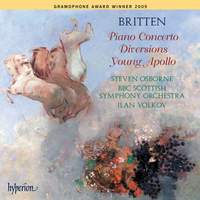Interview,
Steven Osborne on Britten
 Tonight Steven Osborne makes his thirteenth appearance at the BBC Proms, performing Britten’s Piano Concerto (1938) with Juanjo Mena and the BBC Philharmonic. It’s an understatement to say that the Scottish pianist is no stranger to this piece, having performed it a dozen times in the composer’s centenary year alone and recorded it for Hyperion nearly a decade ago, along with Young Apollo and Diversions (the disc won a Gramophone Award in 2009, and prompted The Guardian to observe that ‘Osborne's account has such deftness and wit that its only possible rival on disc is the performance by Sviatoslav Richter with Britten conducting’).
Tonight Steven Osborne makes his thirteenth appearance at the BBC Proms, performing Britten’s Piano Concerto (1938) with Juanjo Mena and the BBC Philharmonic. It’s an understatement to say that the Scottish pianist is no stranger to this piece, having performed it a dozen times in the composer’s centenary year alone and recorded it for Hyperion nearly a decade ago, along with Young Apollo and Diversions (the disc won a Gramophone Award in 2009, and prompted The Guardian to observe that ‘Osborne's account has such deftness and wit that its only possible rival on disc is the performance by Sviatoslav Richter with Britten conducting’).
I spoke to Steven over the phone recently as he emerged from a three-year sabbatical from the work…
When did you first come across the Britten Concerto?
I was at music college, and there was a score in my teacher’s room which I flicked through…and years later Hyperion asked me to record all of the Britten works for piano and orchestra (in 2006) and that was really the first time I looked at it properly!
And how much has your approach to the piece altered in those ten years?
Generally I find that my conception of things doesn’t magically change, it’s always more a case of things shifting incrementally – for me it’s often about taking less control and seeing what happens…So it probably will be a bit different, but the speeds are likely to be similar: it’s not one of those works that’s asking great philosophical questions about the meaning of life!
This was written as a Proms commission: how much was Britten writing specifically for the Proms audience?
The works he wrote for piano tend to be very virtuosic, and it’s very notable that they’re on the lighter end of his output – certainly the Concertos and Young Apollo…Diversions is perhaps slightly different, but even that doesn’t set out to plumb the depths in the way that something like the War Requiem does, or even the Violin Concerto. I wonder if the fact that he played the piano himself was in some way a factor…?
Why do you think it’s been comparatively neglected, both in relation to the rest of Britten’s output and in relation to other twentieth-century piano concertos?
It’s pretty difficult to bring off, partly because it doesn’t quite hang together – there are a couple of tempo changes in it that mean that you quite often get to the end of the piece and feel just a bit short-changed! The end of a piece is always so important, so it you get to the end of a piece and it falls a bit flat…But it’s a fantastic piece for what it is, let’s say on the lighter end of what he does – it’s SO characterful, and the movements are so beautifully contrasted. I suppose you can’t really say that the Violin Concerto’s been massively played either, so it’s maybe a more general thing in that the operas are considered more central to his output. But perhaps it’s also partly about the English thing – Tippett’s Piano Concerto isn’t done very much, and the Vaughan Williams Piano Concerto – when do you hear that?! There might be a slight prejudice in favour of Germanic music which tends to sideline these things…
Which version of the piece will you be performing?
I do the second version, which I think is a sign of his genius. In the third movement, we’re not talking about a slight revision - it’s actually a completely different shape. He uses a little bit of the same materially, but he fundamentally reworks it in a way that makes the piece hang together much better. In the original version it’s a sequence of different dance-forms linked by recitative passages, which makes the whole piece become like a sequence of four character-pieces which don’t necessarily relate very well. But in the revised version, it has much more gravity to it: somehow he creates a focal point of the whole piece and to me it makes it much more coherent, much more satisfying.
Steven Osborne's Gramophone Award-winning disc of Britten (including Diversions, Young Apollo and the Piano Concerto is available on Hyperion Records.
Available Formats: CD, MP3, FLAC



